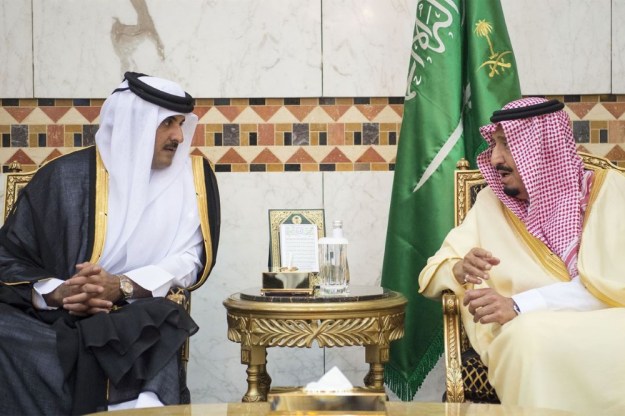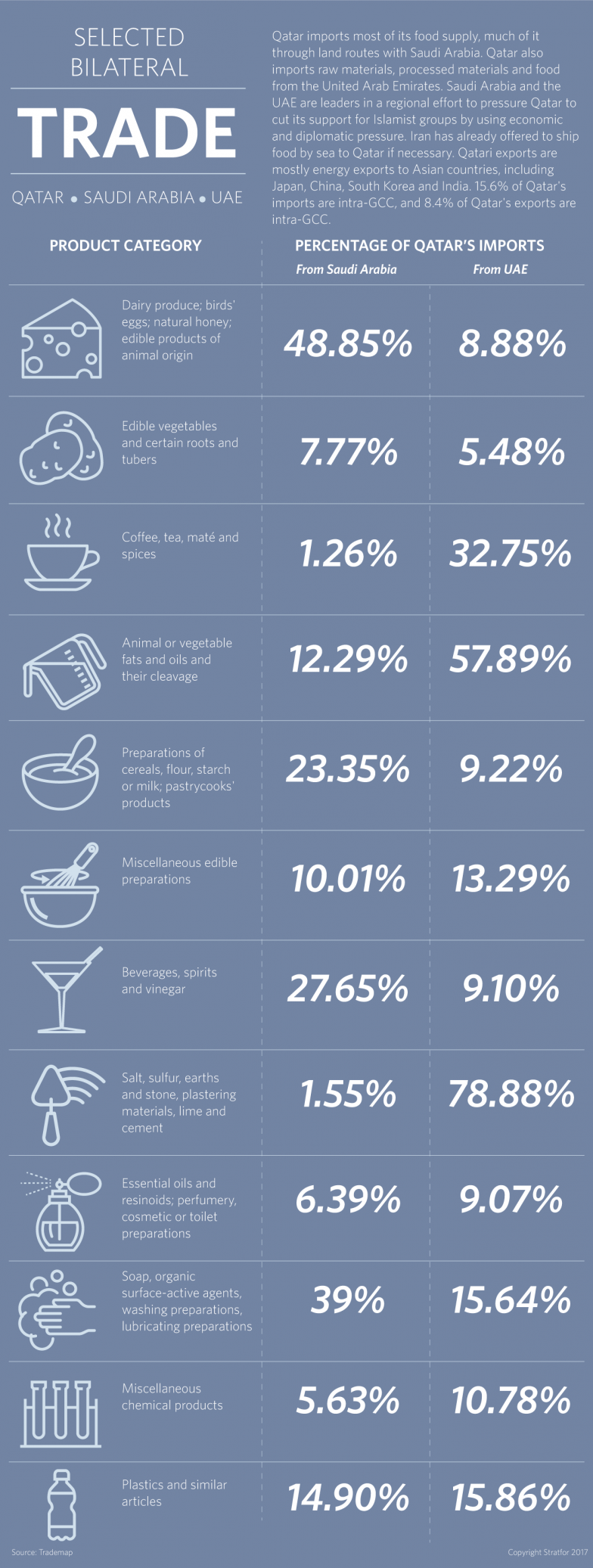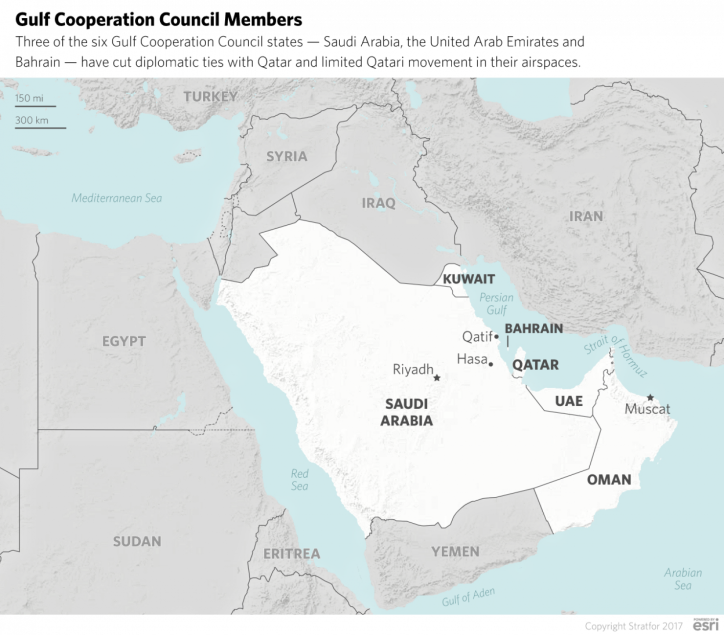 A conflict has broken out in the Middle East, as the Saudi Princes seek to re-establish hegemony over the Qatar Princes. It is yet another fissure in the Middle East, the world’s most critical flash point. Here Stratfor explains the origin of the conflict, what has happened, and its likely consequences. Of course, the extreme but unlikely consequences could be much worse — such as sparking the long-awaited destabilization of the region.
A conflict has broken out in the Middle East, as the Saudi Princes seek to re-establish hegemony over the Qatar Princes. It is yet another fissure in the Middle East, the world’s most critical flash point. Here Stratfor explains the origin of the conflict, what has happened, and its likely consequences. Of course, the extreme but unlikely consequences could be much worse — such as sparking the long-awaited destabilization of the region.
Former friends Saudi King Bin bin Abdulaziz and Qatar Emir Sheikh Tamim bin Hamad Al Thani.
Long-standing tensions among members of the Gulf Cooperation Council (GCC) that intensified over the past two weeks have culminated in several Arab governments suspending relations with Qatar. The current crisis has roots in multiple areas in which GCC states do not see eye to eye, including in their attitudes toward Iran, their manifold perspectives on supporting political Islamists and the degree of economic and strategic rivalries among them.
On June 5, Saudi Arabia, Egypt, the United Arab Emirates and Bahrain announced they would suspend diplomatic relations with Qatar, which has long bucked the Saudi line on condemnation of Iran and support for Islamist groups such as the Muslim Brotherhood. Their declarations were followed by those made by the Tobruk-based House of Representatives government in Libya, which has close ties to the United Arab Emirates and Egypt; the Saudi-backed government of Yemen led by President Abd Rabboh Mansour Hadi; and the Indian Ocean island nations of Mauritius and the Maldives, which have close ties to the Saudi and Emirati governments.
The countries said they would halt sea trade with Qatar as well. Saudi Arabia — the only country with a border with Qatar — has also blocked land transport across that border, according to reports. Several regional airlines such as Emirates, Bahrain’s Gulf Air, Flydubai and Abu Dhabi’s Etihad Airways have canceled flights into Qatar, while Qatar Airways has canceled its flights to Saudi Arabia. Likewise, GCC airspace is off-limits to Qatari flights. The countries that scrapped diplomatic relations with Doha have given Qatari citizens in their territories two weeks to depart, while diplomatic staff were given until June 7 to leave. Because of the diplomatic disruptions, Qatar has also been removed from the Saudi-led coalition in Yemen, though Qatar filled only a token role in that operation.
In announcing the diplomatic and travel freezes, the countries cited Qatar’s alleged support for groups that they consider terrorists, such as the Muslim Brotherhood, the Taliban and Hamas, as well as others, including al Qaeda. Qatar hosts a significant number of delegates from groups such as Hamas or the Taliban and has fashioned Doha into a neutral zone that allows for negotiations to take place. Qatar’s willingness to host these organizations, of course, has been met with disapproval in the past. Saudi Arabia has also blamed Qatar for allegedly supporting Shiite militants in eastern Saudi Arabia and Bahrain.
Meanwhile, reports have emerged that after Qatar urged them to leave the country, several Hamas leaders are relocating to Turkey, Malaysia and Lebanon. This echoes moves Qatar made to try to defuse a similar crisis in 2014. However, Qatar has not indicated any willingness to soften its support for the Muslim Brotherhood, the Taliban or Hamas. Backing such groups has broadened Qatar’s regional legitimacy and granted Doha some leverage with the United States and other countries that seek to control the behavior of the Islamist groups.
The Spark of a Crisis.
The current deterioration in relations between the Arab states and Qatar was sparked by the remarks of Qatari Emir Sheikh Tamim bin Hamad al-Thani, who was quoted expressing support for Iran {see another perspective on this, from MEMRI}, Hamas and the Muslim Brotherhood at a military graduation speech on May 23. The statements triggered a response from other Gulf states that started banning Qatari media outlets, including Al Jazeera. A flurry of accusations then flew through media outlets on both sides.
The decision by a hacking group calling itself GlobalLeaks to release emails purportedly from Yousef al Otaiba, the United Arab Emirates’ ambassador to the United States, also suggested strong ties between himself and a neoconservative pro-Israel think tank, further roiling the media environment (see this and this). The toxic back-and-forth that built momentum for Qatar’s estrangement could suggest a concerted move by Riyadh and Abu Dhabi to pressure Doha by portraying it poorly.
Closing the land border and halting air and sea traffic is intended to put economic pressure on Qatar. Between 40% and 50% of its food imports, including most fresh dairy, vegetables, fruit and processed cereals, are shipped overland from Saudi Arabia. But when considering overall imports, the blockade will not have as much of an effect on Qatar, which receives only 8.8% of its imported goods (including construction materials) from the United Arab Emirates, and only 4.3% from Saudi Arabia.
The air travel ban will pile more problems on a struggling Qatar Airways, which immediately lost its right to serve 19 destinations in the countries that issued the bans. The state-linked airline was already dealing with a 38% loss in its brand value over the past year (it is now worth $2.2 billion). If the trade and travel blockades continue, Qatar may experience food price inflation, though food aid pledged by Iran could mitigate that. In the highly competitive banking and financial services sectors, prolonged economic sanctions could undermine Qatar’s competitiveness with other GCC states.
Some Qatari media outlets could feel more intense pressure from Saudi Arabia and the United Arab Emirates as well. The Saudis have already blocked the Doha-based Al Jazeera, and Qatar will feel pressure to shut down the outlet along with other smaller channels like Al-Araby Al-Jadeed. Those media outlets, which routinely contradict the GCC’s heavily Saudi-influenced positions, have afforded Qatar the ability to have an outsized influence on policy debates.
 Parallels can be drawn between the incidents of the past week and the 2014 conflict that pitted the United Arab Emirates and Saudi Arabia against Qatar. That spat arose from Doha’s continued embrace of regional Islamist groups that Riyadh and Abu Dhabi deemed a threat, particularly the Muslim Brotherhood. Both disputes stem from the same root: Qatar lacks the demographic and sectarian diversity with which other GCC states must contend, freeing Doha to support regional groups that help it expand its influence without stirring up trouble at home. However, the diplomatic and trade cutoffs of the current dispute are unprecedented.
Parallels can be drawn between the incidents of the past week and the 2014 conflict that pitted the United Arab Emirates and Saudi Arabia against Qatar. That spat arose from Doha’s continued embrace of regional Islamist groups that Riyadh and Abu Dhabi deemed a threat, particularly the Muslim Brotherhood. Both disputes stem from the same root: Qatar lacks the demographic and sectarian diversity with which other GCC states must contend, freeing Doha to support regional groups that help it expand its influence without stirring up trouble at home. However, the diplomatic and trade cutoffs of the current dispute are unprecedented.
As its ties with its immediate neighbors erode, Doha could turn to Iran, Turkey and Iraq for help. A June 5 meeting in Baghdad among Turkey, Iran and Iraq called by the head of Iran’s Expediency Council highlights that possibility. Qatar and Turkey have built close and ever-growing ties, and Iraq’s powerful Sunni parliament speaker met with al-Thani on June 4, a sign of the countries’ positive relationship. While none of these countries could supplant the support that Qatar has enjoyed from the GCC network for decades, or from the United States, Saudi Arabia’s efforts to punish Qatar could spur deeper cooperation between Qatar and other non-GCC countries.
The actions of the United Arab Emirates, Saudi Arabia and others are part of a coordinated effort to push Qatar to align with the Saudi-led consensus on the Muslim Brotherhood and Iran. Strong support by the United States for the Saudi-led coalition likely bolstered those countries’ confidence in making the move to isolate Doha to this degree.
However, that rift also complicates the United States’ mission, since it counts on a tight Sunni coalition to manage regional threats like the Islamic State. Even as Riyadh tries to undermine the trust Washington has placed in Doha, it will not be easy as Qatar hosts the second-largest U.S. military presence in the region, including the U.S. command center coordinating the fight against the Islamic State. Additionally, a substantial percentage of its regional air sorties stage from the al-Udeid Air Base in Qatar.
For its part, the U.S. military announced that it does not plan to adjust its posture in response to the diplomatic row, which will provide immediate reassurance to Doha that its key backing is assured and prolong Qatar’s ability to hold out under GCC pressure. Meanwhile, though the United States routinely maintains military ties with countries that are at odds with one another, the severity of the intra-GCC split this time around only underscores the weaknesses of its effort to stand up a viable “Arab NATO.”
is republished with permission of Stratfor.

No comments:
Post a Comment